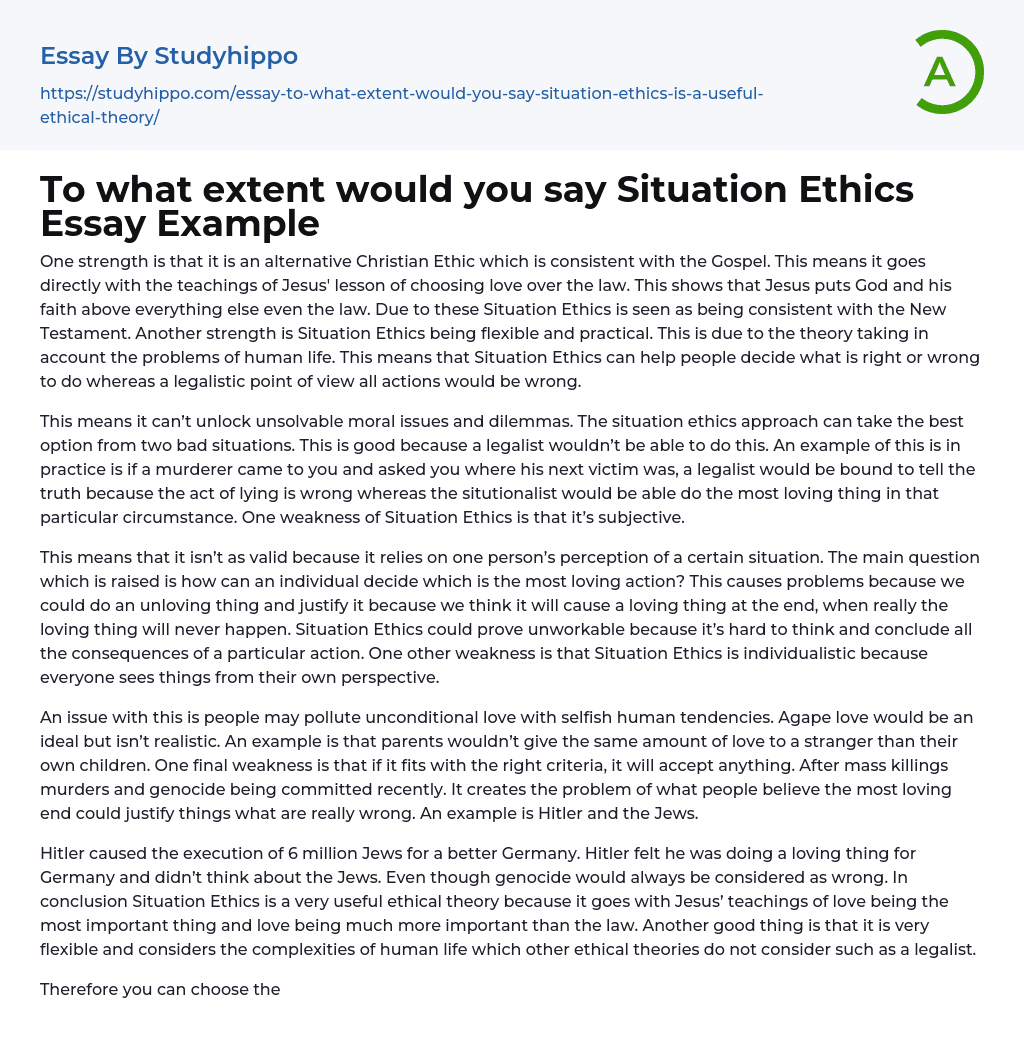One of the strengths of Situation Ethics is its consistency with the Gospel, making it an alternative Christian Ethic. It aligns with Jesus' teachings on choosing love over the law, emphasizing the importance of putting faith in God above all else, including the law. Therefore, Situation Ethics is regarded as coherent with the principles of the New Testament. Additionally, Situation Ethics is characterized by its flexibility and practicality. It acknowledges the challenges faced in human life, allowing individuals to determine right from wrong, unlike a legalistic perspective where all actions would be considered wrong.
Situation Ethics cannot solve moral problems that are impossible to resolve. However, it allows for choosing the better alternative between two unfavorable choices, which a legalist cannot do. For instance, when faced with a murderer seeking information about their next victim, a legalist wo
...uld be obligated to speak the truth, as lying is considered immoral. On the contrary, a situationist would have the flexibility to act lovingly according to the specific circumstances. Despite its advantages, Situation Ethics has a drawback in that it is subjective.
Situational Ethics is deemed less valid as it is based on an individual's perception of a specific situation. This raises the question of how someone can determine the most loving action. Consequently, it may lead to justifying an unloving act under the belief that it will ultimately result in a loving outcome, even if that outcome never materializes. Furthermore, the feasibility of Situation Ethics is hindered by the difficulty of assessing and anticipating all the consequences of a given action. Additionally, this ethical framework is inherently individualistic as each person views situations from their own unique perspective.
The downsid
of this idea lies in the potential for people to contaminate selfless affection with selfish tendencies. Although agape love is a commendable ideal, it's not feasible in reality. Take, for example, parents wouldn't show the same level of fondness towards a stranger as they would towards their own children. Another limitation is that if certain prerequisites are fulfilled, such kind of love can accept anything indiscriminately. This creates an issue because it might justify genuinely immoral acts like large-scale killings, murders and genocides witnessed recently. It brings up the debate over whether striving for what some consider being the ultimate loving result can validate actions fundamentally wrong—in light of Hitler's treatment of Jews.
Hitler, in an effort to create a better Germany, caused the execution of 6 million Jews. He believed he was acting out of love for Germany and did not consider the impact on the Jewish population. Despite the universally acknowledged wrongness of genocide, it can be concluded that Situation Ethics is a valuable ethical theory. This is due to its alignment with Jesus' teachings on the primacy of love and its superiority over law. Additionally, Situation Ethics stands out for its flexibility and recognition of the complexities of human life, unlike other ethical theories such as legalism.
Hence, individuals possess the capacity to choose the most optimal solution in an adverse situation, thus lessening its impact. However, this approach does contain numerous shortcomings, primarily being dependent on personal biases instead of objectively determining the best strategy. This divergence is clearly seen when contrasting different viewpoints such as that of a mentally impaired individual versus someone deeply religious or an atheist and a Catholic. As
a result, one's beliefs and tendencies significantly shape their decision-making process, guiding them towards either choosing a path of selflessness or yielding to a self-centered desire that benefits their own needs.
- Values of Life essays
- Ethical dilemma essays
- Normative Ethics essays
- Virtue Ethics essays
- Belief essays
- Deontology essays
- Moral essays
- Virtue essays
- Work Ethic essays
- Puritans essays
- Afterlife essays
- Buddhism essays
- Christianity essays
- Deism essays
- Faith essays
- God essays
- Hinduism essays
- Islam essays
- Jews essays
- Judaism essays
- Monotheism essays
- New Testament essays
- Ritual essays
- Sin essays
- Soul essays
- Theology essays
- Confession essays
- Devil essays
- Miracle essays
- Monk essays
- Revelation essays
- Atheism essays
- Immortality essays
- Jainism essays
- Sinners essays
- Bible essays
- Old Testament essays
- Salvation essays
- Temple essays
- Taoism essays
- Pilgrimage essays
- Freedom Of Religion essays
- Existence of God essays
- Christian Worldview essays
- Cosmological Argument essays
- Gautama Buddha essays
- Karma essays
- Buddha essays
- Baptism essays
- Holy Spirit essays




